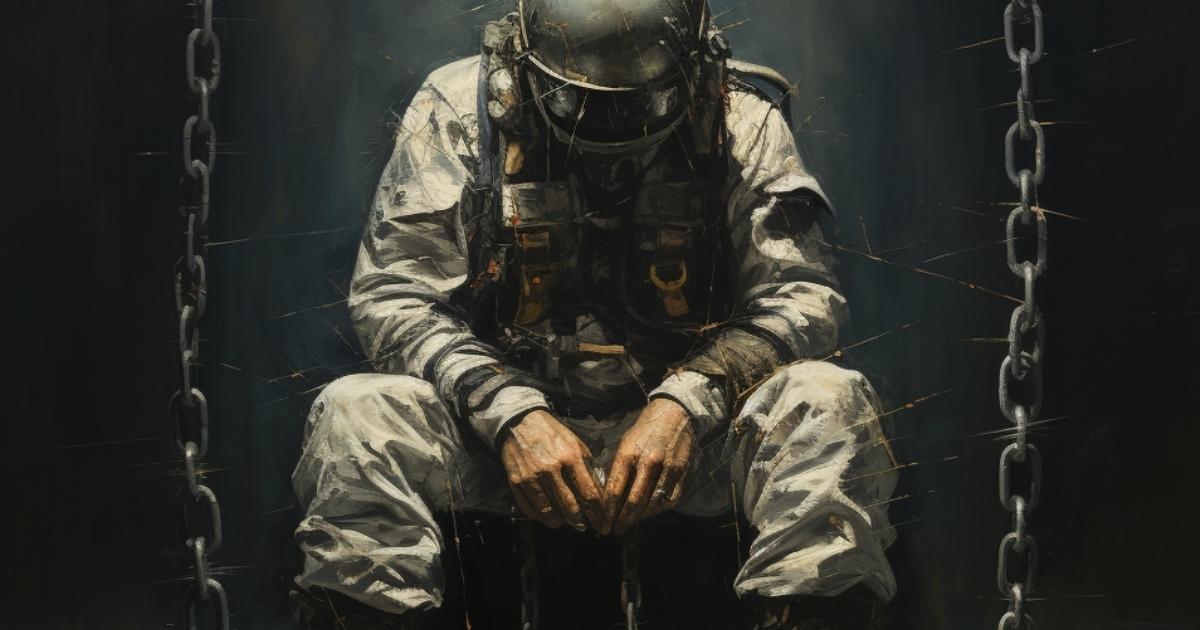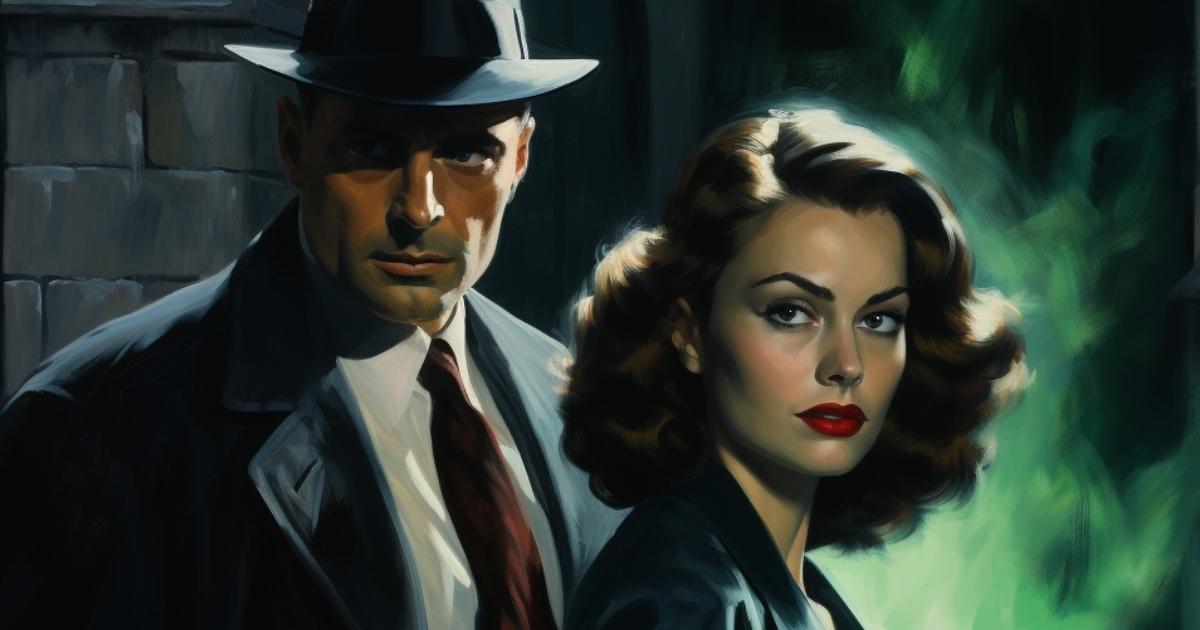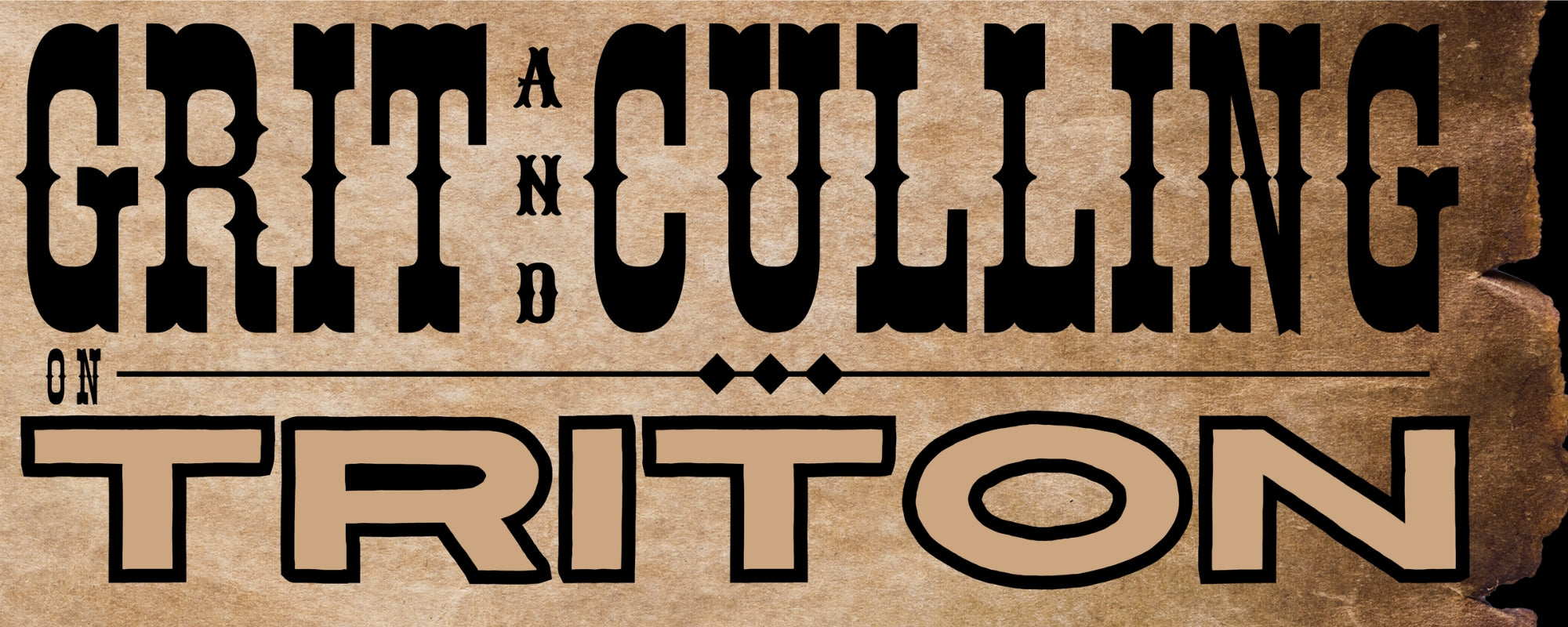
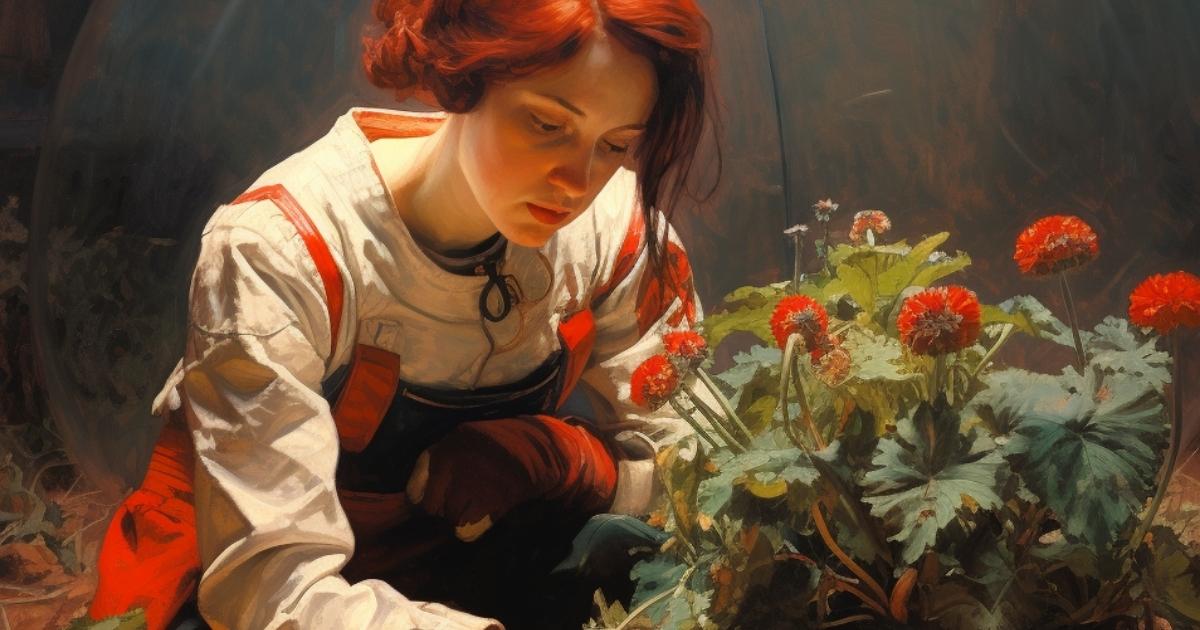
Grit and Culling on Triton
By Robert E. Harpold
That cherry tomato was going to taste sooo good. The skin popping as her teeth closed around it, the cold of the fruit combatting the warmth of her mouth, the tart juice lighting up her tongue, the sweetness rolling over her for a few precious moments before reality returned.
Kemma’d earned it. All week been using grit, as they say. She released the atmospheric scrubber’s pole, now reinforced with a shaving from one of her rover’s support struts, and hopped toward her burrow across Triton’s pinkish surface.
A small pile of ice pellets lay scattered across her path near her newly patched crop shelter. She jumped to the side to avoid tripping, then floated back to the ground. The pellets, origin unknown, had rained down last week, wrecking her farm.
It was lucky she’d kept the tomato vine in her burrow. Couldn’t’ve done otherwise, really. On her seventh kiloday, her parents had sacrificed themselves to their resourcer and became fertilizer. Culled themselves, she supposed, to save the family. If they hadn’t, the three of them would’ve ended up eating each other like the Wasler family two farms over. Now, her parents were in every plant she ate, and no way was she going to risk the crop they had treasured most.
Kemma reached the booth at the center of her farm and slid the airlock door aside. When the pressure equalized with that in her inner sanctum, she shed her backpack and plugged it into the oxygen and charging stations, then shucked the rest of her suit. A quick check showed it had no rips or broken wires, so she hung it up and opened the inner door. And screamed.
Against the far wall, beside the gaping mouth of the resourcer, was a woman Kemma had never seen before.
“Oh, wow.” The woman, wiry as Kemma and lighter of skin, licked her fingers. “Didn’t realize that was the reaction I’d get. What are these things, anyway?” She gestured to the vine, which Kemma now saw was bare. Not a single tomato remained. Only stems where they had once been.
Her parents were in those tomatoes.
How many plants, how many soybeans or broccoli heads, would she have to cull to replace the organics from those tomatoes? Kemma had never punched someone, but she’d heard others describe it. She clenched her hand into a fist.
The thief’s mouth twisted as though she had stubbed her toe. “Hey, sorry about the round things. I ran out of food. Didn’t want to take your stuff, but no choice, right? I know we’re all struggling, but we’re also all in it together.” The woman extended a hand. “Bara. What’s your name?”
“You ate them all. They… Get out!” A tear trickled down Kemma’s cheek, the first since her third kiloday.
Bara dropped her hand. “You wouldn’t throw me into the cold and vacuum, would you?”
Kemma knew everyone in Endurance, all fifty-seven of them. Never seen anyone else. She knew people lived elsewhere, maybe on Triton’s dark side, or near one of the ice volcanoes, but it had never occurred to her that someone could leave their town. Nothing out there but the decision between a quick or slow death.
The council would have told her to feed this stranger to the resourcer. She wanted to. Her fingers twitched.
“Anyway,” said Bara, “I really am sorry about the…whatever they are. But I’ll make it up to you.”
Make up for the skin and bones of Kemma’s parents? Make up for nothing awaiting her at night but her cold rocky floor and lighting dimmer than the outside, and the bland soup of protein paste and vegetables? Especially after she’d lost so much last week, including the potatoes and turnips that provided
a good chunk of her electricity?
Kemma laughed.
“I mean it,” said Bara. “You know that comet that hit the other day? My town is sending me to the impact site.”
A comet strike. That explained those ice pellets that had trashed her farm.
“Could show it to you,” said Bara. “Gonna be a lot of water there. A chunk of pure water ice should more than make up for these little round things.”
If Bara knew how much those tomatoes meant to Kemma, she would think Kemma was a hedon. Besides, Kemma would lose those calories forever if she didn’t take the offer. Her stomach growled. “Fine.”
🍅
They left the next day in the rover Bara had parked behind Kemma’s water-splitting station. Kemma had never ventured outside Endurance before, and she regretted doing so now. She still had to harvest kale and spinach from their hydroponics beds, her indoor UV light had started flickering, and even though Bara had donated the charge from her suit’s thermo- and piezo-electricity-generating systems, Kemma needed to put some hours on the electricity bike. Instead of handling any of those necessities, she had to spend the day with the thief who had eaten all her tomatoes.
Bara chattered throughout the journey, saying little that needed saying, all about how a series of geysers had erupted before she was born and wreaked havoc on her town, and how the folks would’ve died if they hadn’t sheltered each other until they’d repaired the damage.
The Sun, a tiny disc that peeked through hazy nitrogen clouds, lit the area enough to show any large obstacles, but Bara kept the vehicle’s headlights on full. The rover passed between towering block-like grabens and trundled into shallow ridges, jostling Kemma and Bara in their seats and occasionally banging them into the side walls.
Even four kilometers from the impact site, large chunks of water ice and volatiles littered the landscape. Just a few scattered pieces at first, but soon, Bara was weaving around them in great number. It would have taken Kemma her entire life to mine this much material from beneath the surface, and the comet had done it in an instant.
The lip of the crater rose before them. Bara, mercifully, stopped talking as the rover lurched toward the top and parked parallel to the edge. Before Bara could say anything, Kemma popped open the door and stepped out.
It was a lake of ice. The glassy surface filled the crater, stretching for hundreds of meters, with nuggets spilling over the edge. Enough water for thousands of farms.
She turned to Bara. Kemma hated she had to share this moment with someone like Bara, but at least she had someone to share it with.
“Well?” Bara asked. “Are we even?”
When Kemma eventually told the community at the upcoming festival, they would be ecstatic. The ice and volatiles here could replenish their drained resources. More than that, it was the most beautiful landscape she had ever seen. The ice twinkled from the starlight.
“It’ll do.”
🍅
Endurance’s meeting shack had four metal walls, a ceiling, tables along the front wall beside the airlock, and a radioisotope thermal generator that provided heating, which made this shack more luxurious than the other dwellings in town. Kemma stood at the front of the hall. The entire community, all fifty-seven of them, crowded together before her in the warm air. They hadn’t removed their suits because no one would do something that crazy when a leak could empty the air at any moment, but they held their helmets. Every one of them listened in rapt attention.
Kemma held up a jar containing water from the site. Cleaner by far than what emerged from their recycling systems. She had allowed herself a sip after bringing it home. So smooth, so clean, almost sweet. It had made her feel like a hedon. “Pure water. There’s enough to double our town, and we don’t have to dig for it.”
The others remained silent, but their faces relaxed as they listened, and thin traces of smiles appeared. People who had grown up with her and people old enough to have known her parents, all looking to her for hope.
Brev strode toward her from the tables. His head had gone gray, and he was over twenty kilodays old, the first to reach that age since the starship left. He was rumored to have sabotaged his kids’ suits to avoid sharing resources after a crop failure. Probably wasn’t true, probably just hearsay, but certainly the circumstances of their deaths had been suspicious.
He stopped beside her. His lined face showed pity. “Kemma, that’s not who we are.”
A dull murmur filled the room.
“But it’s free water,” said Kemma. “We need that. How many births have we disallowed because our community didn’t have the resources?”
Brev raised his voice to overpower the murmuring. “We’re not hedons. You know of those who left on the starship three generations ago.”
The town responded in a unison monotone. “So in love with their games and their leisure, they uploaded themselves into machines.”
Brev finished the response in the same monotone. “Sacrificed their own bodies so they could continue their pleasures of the flesh.”
Kemma tightened her grip on the jar.
Brev put a hand on her shoulder. “Here in Endurance, work is sacrosanct. It always has been, from the generation born on Earth to us, the third-generation descendants of those who chose to remain here because the starship-dwellers had fallen into moral degeneracy. What you’re talking about, Kemma, would make us no better than those hedons. Like the Waslers, who tried to keep their rose plant and lost everything. We are made truly alive not by pointless pleasures, but by hard work and sacrifice.”
“Work’ll still be plenty hard,” said Kemma. “Hauling the ice back here. Using it.”
“That isn’t real work,” said Brev. “That isn’t sacrifice.”
Brev had no official authority. No one had chosen him as leader. Still, though the crowd looked unhappy, one person nodded, and then another and another. Lines returned to their faces, their smiles replaced by dull eyes and grim determination. Kemma lowered the jar.
“Not talking about luxury.” She hoped no one knew about her tomato plant. “It’s just… we keep losing crops, and the machines break, and nobody knows how to fix them, and we don’t have the resources to make new ones, and—”
“And so, we cull.” Brev made it sound reasonable, and maybe it was. Learn to live with less. Treat it like a test of character.
But she had culled so much already. She had lost her tomatoes.
“Kemma.” Brev’s spoke as if comforting a child—if anyone in Endurance were allowed a child. “No one is coming to rescue us. We’re it. Our community depends on each individual for its survival. Toss the water. It makes you weak. And what makes you weak, makes us all weak.”
Her neighbors eyed each other, wondering which ones among them would snitch if they stole their own comet water. Kemma snapped on her helmet and cycled through the airlock behind her. Brev was right. Endurance was built on hard work and sacrifice. Only with those virtues could it survive. Comet water might save them in this moment, but it would weaken their resolve for the next challenge.
She opened the jar and let the now-frozen water drop to the ground. It rested on the nitrogen surface, clear and tempting.
🍅
Another long day. Fewer potatoes and turnips were recovered than she’d expected, which meant more time on the electricity bike. Scrubber’s internal wiring had snapped from the cold, shutting down the pull of methane from the thin atmosphere. Kemma’d cut away a portion of the metal support, snipped the bad sections of wire, and soldered the good together. Scrubber was shorter now, but at least it worked again. Culled part to save the whole.
Help would’ve sped up the task. Like the kind she could get from Bara’s town.
She stumbled into the airlock. The outer door jammed, but she muscled it closed. After putting an hour on the bike, she plugged her backpack into the wall, shed the suit, and entered her sanctum.
Even in the dim light, it was obvious the tomato plant was suffering. Its leaves were crinkled, brown patches covered the vine, and no new buds had formed. It wouldn’t last much longer, not without better nutrients, but she had nothing to feed the resourcer.
She sank to the dusty ground. It dug into her tailbone, but she couldn’t find the energy to move to a more comfortable position. Tomorrow, she would go outside and wear down her muscles by planting and harvesting and patching equipment older’n she was. Tonight though, she would be without a tomato to alleviate her suffering. Judging from the vine’s condition, she might never have a tomato again. She needed one. She didn’t care if it made her a hedon.
No tears this time. Kemma was past tears.
She reached into the airlock and dragged her toolkit across the ground toward her, then from it, pulled out her knife—the one she’d used to shorten the scrubber. It had cut through metal. It should make easy work of bone.
She slid off her sock and rolled up her pant leg.
🍅
Kemma hobbled to the shack in the center of Brev’s farm for another hundred-day festival, still acclimating to the metal leg she’d cut for herself from the rover’s support beam. Rest of her might also become metal before long. Not that there was much left of her to replace. Just skin and bones.
Carrying an insulated bowl of carrots in one arm, she reached for the shack’s door. Movement caught her eye. On the horizon, just over two kilometers away, a rover rolled in her direction. In the next moment, more rovers appeared. A caravan. Not from Endurance, and besides, everyone from Endurance had already parked at the shack. These models looked like the rover Bara had driven.
Kemma paused and let them come to her. The lead vehicle stopped meters from her, and a figure bounced out.
“Kemma? Is that you?”
Bara’s voice. Must’ve remembered Kemma’s frequency. Nice of her.
“Yes.”
“Oh, good. Was hoping it was you. Look, we’re heading back to the comet to grab more stuff. You want to come with? Consider it extra repayment for me eating those round things. Been having a hankering for them. You got any more?”
Kemma remembered the comet’s lake, stretching halfway to the horizon, clear and sparkling. She could taste that sweet water. This morning, her water smelled of piss. Purifier needed a replacement filter, and she didn’t know how to make one. Didn’t know anyone who did. And that methane surrounding the crater would provide great fertilizer for her plants. Maybe it would have saved her lower leg.
She sounded like a damned hedon.
“Can’t.” Kemma put her hand on the airlock door behind her. “Busy now.”
She ducked inside before she could change her mind.
Most of the town had already arrived, and had squeezed into the room. After Kemma placed her carrots on the table alongside the other dishes, a hand rested on her shoulder and halted her.
“Kemma.” Brev winked at her.
For a moment, she worried he had seen her speaking to Bara. “Brev.”
“Stay close to the front.”
Could mean anything. Could be a punishment for some infraction she hadn’t known she’d made. Could be a reward, though she didn’t know what reward this town had to give. Kemma nodded and hobbled to a spot between Milda and Verl in the center of the front row.
After the rest of the town arrived, Brev began with the normal status report: the weather forecast for the upcoming hundred days, meals provided to the festival, and reductions in farm production for each person. Nothing unusual.
“Kemma, please come up here.”
This was the moment he had warned her about. Conscious of the eyes on her, wondering if they were jealous or sympathetic, she hopped with an awkward gait to stand beside Brev.
“Kemma has shown the grit we admire here in Endurance. When her crops were suffering, she sacrificed half her leg to the resourcer. That is the Endurance way, and she personifies the trait we all strive for. Because of that, Kemma, you are granted permission to bear a child.”
For a moment, no one spoke. Astonishment was on all their faces. Then someone clapped. Others joined in, and soon, echoing applause filled the room. No child had been allowed in at least two kilodays.
No one realized how stupid it was to allow one now. She had culled half her leg because she didn’t have the nutrients necessary for her tomatoes. Even with the sacrifice, the tomatoes hadn’t come back. How could she grow a child, much less raise it, if she couldn’t even provide for a tomato plant?
Brev smiled at her as though he were a benevolent god who had granted a wish to his most devout worshipper. He had to know better. Did he want her to die? Or was he really this stupid?
He patted her back, signaling her to return to her place among the crowd. She went, speechless. Milda and Verl took turns shaking her hands and smiling. Did they smile because they thought she had been granted a gift, or just to be polite?
Brev gestured for the feast to begin. Plates were handed out, and people lined up at the food table. Kemma let everyone go ahead of her.
“Gotta get in line, Kemma.” Milda smiled. “Gonna need those calories now.”
“Guess so.”
In that moment, Kemma could see the future. The town would continue dwindling, and equipment would continue breaking until no replacement parts remained. The slow attrition of crops would continue. Maybe people would help with Kemma’s child, or maybe they would be unable to afford it. And every single person would stay here until they died, one by one, because they knew no other way.
They needed a push.
As the others ate, Kemma put on her helmet and exited through the airlock. No one noticed as she cycled out and hopped to her rover.
The rover trembled to a start. It shook more than in previous days, a consequence of all the pieces she’d shaved from its structure. She slammed her foot down on the accelerator and sped the vehicle into Brev’s soybean building.
The aluminum structure crumpled and tore. The vacuum pulled at the plants, bending them toward the building’s open corner and freezing the nutrient-filled water surrounding their roots.
Kemma paused.
Then, yelling until she was hoarse, she backed up, gunned the engine, and rammed the building again.
She spun the rover in a tight circle and raced toward Milda’s farm. At the farm’s edge, she slammed into Milda’s recycler. Milda could repair it. It might take a couple days, might use more spare parts than she’d like, but she could do it.
At the next farm, Kemma hit the water-splitter. Then she toppled Verl’s scrubber. All repairable, with a bit of sacrifice.
After visiting a quarter of the farms in town, she returned to the meeting hut. Brev’s water purifier stood several meters away, patched, but running. Kemma sped toward it. When her rover struck, the purifier cracked down the middle.
Rovers began rushing from the meeting building to their homes. Kemma hadn’t destroyed all the crops. No one would starve, even if they stayed, but they’d have to make some difficult decisions, maybe think about their future here. Culled part to save the whole.
She rattled toward home. She’d pack everything she could fit onto the seats, on the floor, and in the storage bin. It was time to leave Endurance.
🍅
Another long day. Kemma and Bara had set up the water-extraction system and performed preliminary testing. In the next few days, they would be able to irrigate their crops with comet water. It was nice to work with someone after so many years solo.
Kemma smiled as she bounded down the crater wall, marveling at the shacks and budding hydroponics farms stretched from here to the horizon. Bara had said Bounty wouldn’t have grown this quickly if Kemma’s actions hadn’t convinced a quarter of Endurance to settle here.
Kemma reached her own shack. It was a modest, thin structure, without the same protections as her former burrow. But it was hers, built with her own hands, and it would work until she dug a new burrow. She cycled inside, shucking her suit and entering her sanctum.
There, in the corner, was her reward for everything: a thriving tomato vine. Each cherry tomato was plump and red and shiny, a luxury and a necessity. She didn’t care that she was a hedon.
Kemma plucked the largest tomato from the vine and popped it into her mouth. The juice lit up her tongue, explosions of cold, tart, and sweet.
It tasted sooo good.
Copyright © 2023 Robert E. Harpold
The Author
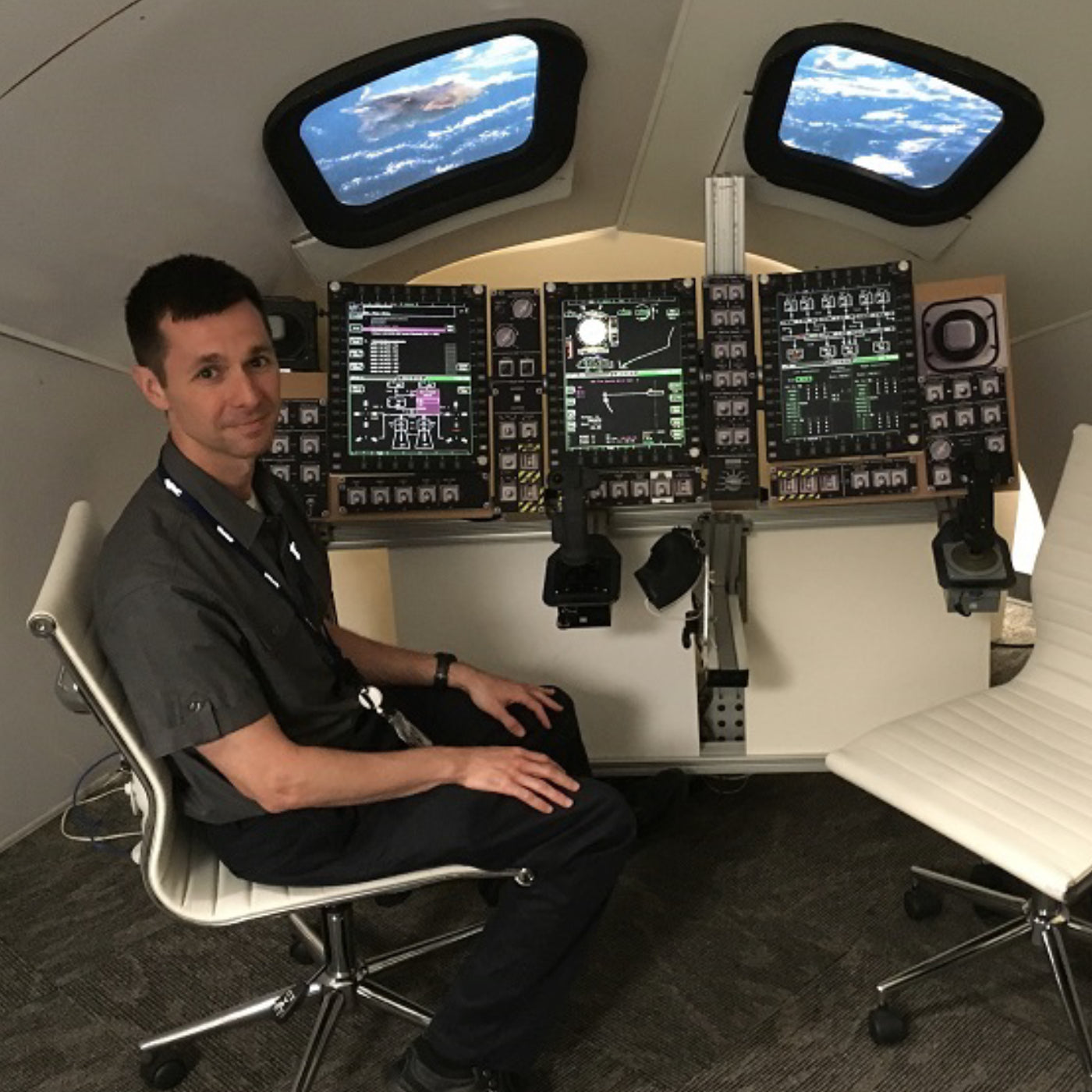
Continue reading

Get Issue Updates
Promotions, new products and sales. Directly to your inbox.


